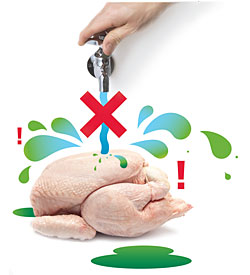 The debate on whether or not to wash raw poultry is a fierce one, but until recently there was no hard-and-fast data to tell us just how risky it is to wash poultry. A recent study from the U.S. Department of Agriculture (USDA) demonstrates that individuals are putting themselves at risk of illness when they wash or rinse raw poultry. Participants in the study prepared a raw chicken for cooking and a lettuce salad. Of the participants who washed their raw poultry, 60% had bacteria in their sink after washing or rinsing the poultry, and 26% of salads were then contaminated. Even more concerning was that 14% of participants still had bacteria in their sinks after they attempted to clean the sink.
The debate on whether or not to wash raw poultry is a fierce one, but until recently there was no hard-and-fast data to tell us just how risky it is to wash poultry. A recent study from the U.S. Department of Agriculture (USDA) demonstrates that individuals are putting themselves at risk of illness when they wash or rinse raw poultry. Participants in the study prepared a raw chicken for cooking and a lettuce salad. Of the participants who washed their raw poultry, 60% had bacteria in their sink after washing or rinsing the poultry, and 26% of salads were then contaminated. Even more concerning was that 14% of participants still had bacteria in their sinks after they attempted to clean the sink.
Of the participants that did not wash their raw poultry, 31% still managed to get bacteria from the raw poultry onto their salad lettuce. Think….improper hand washing and knives and cutting boards that weren’t clean and sanitary.
So what options do consumers have when preparing raw meat?
- Prepare foods that will not be cooked, such as vegetables and salads, before handling and preparing raw meat and poultry.
- Thoroughly clean and sanitize any surface that has touched or been contaminated by raw meat and poultry, or their juices – this includes your hands as well as knives and cutting boards.
- Clean sinks and counter tops with hot soapy water and then apply a sanitizer.
- Use one cutting board for raw meat and poultry and a different one for fruit, vegetables, and cooked foods.
- Wash hands immediately after handling raw meat and poultry. Wet your hands with water, lather with soap, and then make sure you scrub your hands for 20 seconds. Rinse and dry with a disposable towel.
- Reduce your risk by cooking meat and poultry to a safe internal temperature as measured by a food thermometer.
- Beef, pork, lamb, and veal (steaks, roasts, and chops) are safe to eat at 145°F.
- Ground meats (burgers) are safe to eat at 160°F.
- Poultry (whole or ground) are safe to eat at 165°F.
And for those who are wondering: washing, rinsing, or brining meat and poultry in salt water, vinegar, or lemon juice does not destroy bacteria.
To help educators spread the word (or in the case of raw poultry, not spread germs), Drexel University has developed some excellent teaching resources: photo novellas with recipes, animations, and mini dramas. These may all be found on their website: https://drexel.edu/dontwashyourchicken/Videos-Photo-novellas/Overview/
Stay food safe.



